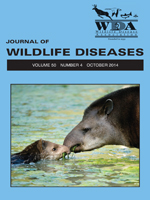As coyotes (Canis latrans) adapt to living in urban environments, the opportunity for cross-species transmission of pathogens may increase. We investigated the prevalence of antibodies to pathogens that are either zoonotic or affect multiple animal species in urban coyotes in the Denver metropolitan area, Colorado, USA, in 2012. We assayed for antibodies to canine parvovirus-2, canine distemper virus, rabies virus, Toxoplasma gondii, Yersinia pestis, and serotypes of Leptospira interrogans. Overall, 84% of the animals had antibodies to canine parvovirus-2, 44% for canine distemper virus, 20% for T. gondii (IgG), 28% for Y. pestis, and 4% for L. interrogans serotype Grippotyphosa. No neutralizing antibodies were detected to rabies virus, T. gondii (IgM), or L. interrogans serotypes other than Grippotyphosa. With 88% of animals exposed to at least one pathogen, our results suggest that coyotes may serve as important reservoirs and sentinels for etiologic agents.
How to translate text using browser tools
1 October 2014
Serologic Survey for Cross-Species Pathogens in Urban Coyotes (Canis latrans), Colorado, USA
Ashley Malmlov,
Stewart Breck,
Tricia Fry,
Colleen Duncan
ACCESS THE FULL ARTICLE

Journal of Wildlife Diseases
Vol. 50 • No. 4
October 2014
Vol. 50 • No. 4
October 2014




